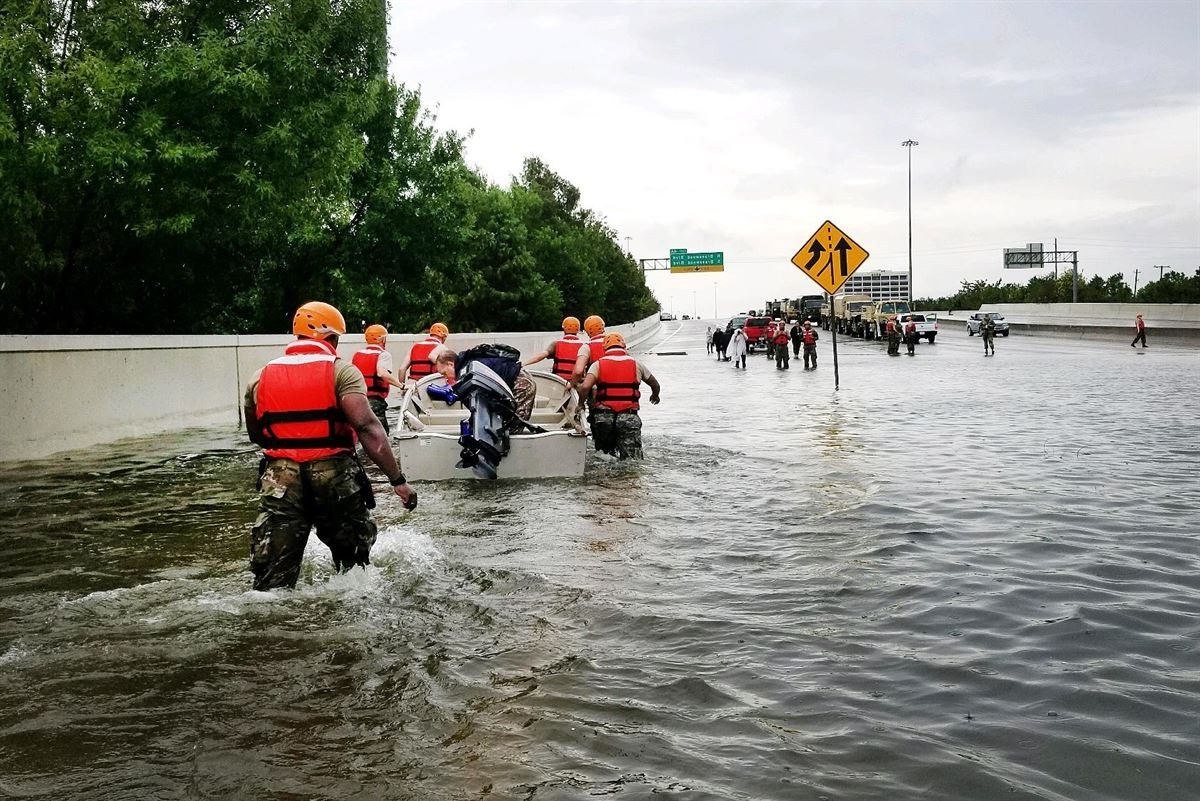Even an immediate reduction to zero greenhouse emissions would still result in a 3°C rise in global temperatures by 2500, find the authors of a new study.

Texas National Guard soldiers in Houston, Aug. 27, 2017, to aid residents washed out by Hurricane Harvey. (Texas Army National Guard photo)
By Brett Wilkins
Common Dreams
Humanity may have passed the “point of no return” in the climate crisis — even if everyone on the planet stopped emitting all greenhouse gases at this very moment, according to a study published Thursday.
The study, published in the peer-reviewed British publication Scientific Journals, asserts that “the world is already past a point of no return for global warming” and that the only way to halt the catastrophic damage caused by greenhouse emissions is to extract “enormous amounts of carbon dioxide… from the atmosphere.”
The crisis “simply will not stop from cutting manmade greenhouse gases,” Jörgen Randers, one of the study’s two lead authors, told Future Human. Humanity, stressed Randers, “should accelerate its effort to cut greenhouse gas emissions… and start developing the technologies for large-scale removal of greenhouse gases from the atmosphere.”
What exactly does a “point of no return” mean for Earth and its inhabitants? The researchers describe “a threshold which, once surpassed, fundamentally changes the dynamics of the climate system,” including “by triggering irreversible processes like melting of the permafrost, drying of the rainforests, or acidification of surface waters.”
The researchers used a computer model called ESCIMO to simulate outcomes from various levels of CO2 reductions until the year 2500. They concluded that even an immediate reduction to zero greenhouse emissions would still result in a 3°C rise in global temperatures by 2500.
Using a more realistic simulation model in which carbon emissions peak in the 2030s and then decline to zero by the turn of the next century, the researchers still found that the planet would warm by the same 3°C, while sea levels would be 10 feet higher than they were in 1850.
Furthermore, the study found that the accelerated melting of Arctic ice and carbon trapped in melting permafrost may increase the amount of water vapor, methane and carbon dioxide in the atmosphere.

Polar bears in 2008 became the first species to be listed as endangered because of forecasted population declines from the effects of global warming. (National Park Service)
Recent research predicts that global heating will cause the planet’s average temperature to increase by between 2.6°C and 3.9°C over the next few centuries.
Scientists at the National Oceanic and Atmospheric Administration (NOAA) in 2017 forecast worldwide sea levels to rise by between one and 8.2 feet—depending on the location—by the end of this century.
There is hope, said Randers, in carbon sequestration — sucking carbon from the atmosphere and returning it underground — but “it is a very big job.”
“[It’s the] equivalent to the work involved in putting all the manmade CO2 into the atmosphere, which has taken us 100 to 200 years of industrial activity,” said Randers.
“Getting it out again will be the same type of effort,” he said.
This article is from Common Dreams.
Please Contribute to Consortium News
Donate securely with
Click on ‘Return to PayPal’ here.
Or securely by credit card or check by clicking the red button:



Your models don’t include ocean movements into account amoung other factors. Further to my point the modeling was created by business students not climate scientists and the data input is oversimplified.
It is not “our” model but a peer-reviewed study in the British publication Scientific Journals. The authors are not students but professors of climate strategy and system dynamics. Please let us know what your qualifications are.
What extracts carbon from the atmosphere are plants.
The work that will be necessary will most centrally involve planting and maintaining vegetation.
I wished climat-change was the only problem.
“the only way to halt the catastrophic damage caused by greenhouse emissions is to extract “enormous amounts of carbon dioxide… from the atmosphere.””
That is only one of many options for geo-engineering. Others will be needed too. The mostly likely method to success would use several paths at the same time, mutually reinforcing.
No answer would be easy. There is likely no answer at all unless many hard things are done.
Wow! We are really in trouble!
While multiple other studies have claimed 9 degree C increase by 2100 or even sooner, I guess we will not have worry about this for another 400 years. Either that, or someone transposed some numbers.